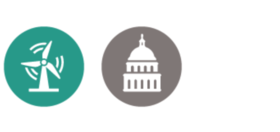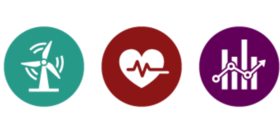Environment and Climate Change
-
Gretchen Daily: The cost of not valuing nature
In this episode on Radio New Zealand, Faculty Affiliate Gretchen Daily shares how traditional systems of wealth measurement don't include nature's contributions.
March 16, 2024
-
King Center initiative: Adaptation and Resilience to Climate Change in the Global South
Climate adaptation efforts being carried out across the Global South will be collated to help shape future climate protection.
March 07, 2024
-
King Center initiative: Climate Change and Political Mobilization in the Global South
New research will equip policy makers and scholars with data on how climate change is shaping politics in the Global South.
March 07, 2024
-
It takes a village: Using game theory to get farmers to fight deforestation
A new model co-built by Faculty Affiliate Erica Plambeck taps into the power of cooperation to promote sustainable palm oil production in Indonesia.
January 11, 2024
-
Could sisal leaves make sanitary napkins more sustainable in India?
A team led by Faculty Affiliate Manu Prakash has found the absorption capacity of a sisal-based material to be higher than those in commercial menstrual pads.
January 08, 2024
-
Meet the economist who wants the field to account for nature
Faculty Affiliate Gretchen Daily shares with MIT Technology Review her work on making the environment more of an element in economic decision-making.
December 26, 2023
-
Global population profile of tropical cyclone exposure from 2002 to 2019
Faculty Affiliate Eran Bendavid aims to identify mitigation strategies and assess the global burden and future risks of tropical cyclones, as per his article in Nature.
December 20, 2023
-
How to stop turmeric from killing people
The King Center's initiative on lead was featured in The Economist for their research which led to a complete elimination of lead-contaminated turmeric in Bangladesh.
November 02, 2023
-
What do EV batteries have to do with health?
The center's initiative on reducing lead exposure combined epidemiology and management to confront a growing threat from lead-acid batteries in electric vehicles.
October 12, 2023
-
King Center supports undergraduate student research in infectious disease lab
Current and former students share their experience studying mosquito-borne viruses in the lab of Professor A. Desiree LaBeaud.
September 25, 2023
-
'Getting a handle' on a potent climate threat
Faculty Affiliate Alison Hoyt is working in a multidisciplinary team of researchers across Stanford to measure emissions of a potent greenhouse gas in extreme conditions.
September 14, 2023
-
They got the lead out of turmeric!
Affiliated researcher Jenna Forsyth and Faculty Affiliate Stephen Luby worked with the Bangladesh Food Safety Authority to eliminate lead-contaminated turmeric in the country.
September 13, 2023
-
Stanford research exposes toxic lead used to enhance color of turmeric
A King Center-supported initiative successfully reduced lead adulteration in turmeric in Bangladesh from 47% to 0% in two years.
September 13, 2023
-
Indian groundwater depletion rates could triple in coming decades as climate warms
A study co-authored by Faculty Affiliate David Lobell shows that the intensifying withdrawal of groundwater for irrigation by farmers in India threatens food and water security.
September 01, 2023
-
Benefits of electric stoves on health and environment in Ecuador
Faculty Affiliate Marshall Burke and former Postdoctoral Fellow Brandon de la Cuesta studied the impacts of a program in Ecuador that put induction stoves in 750,000 households.
August 15, 2023
-
Experts discuss how environmental changes are altering the risk for mosquito-borne diseases
In Stanford News, Faculty Affiliates Erin Mordecai and Desiree LaBeaud discuss what we know and how communities can protect themselves from these changing disease threats.
August 08, 2023
-
The vice of spice: Confronting lead-tainted turmeric
A King Center-supported initiative focused on reducing lead exposure was featured in Undark for their research in Bangladesh, which resulted in government intervention.
July 19, 2023
-
Changing tides
Research funding recipient Ceyenna Tillman shares what led her to study the oceans, and why the next generation of ocean scholars must define the field more broadly.
June 08, 2023
-
Toward a better theory of learning
With support from the King Center, Anirudh Sankar traveled to Uganda to study how small-holder farmers learn about farming practices through a novel irrigation system.
June 05, 2023
-
Beyond climate dread
Faculty Affiliates Stephen Luby, Desiree LaBeaud, and Jade Benjamin-Chung discuss their work in finding solutions to the urgent problems of planetary and human health.
June 02, 2023



